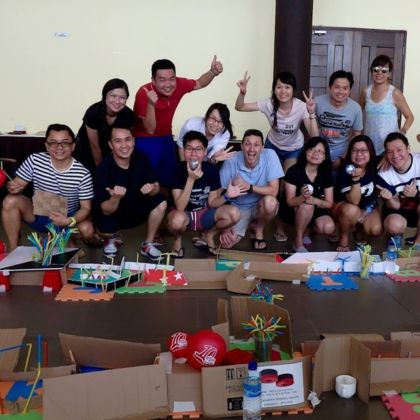
The dynamic nature of Singapore’s business environment demands that leaders continually refine their skills for sustainable success. Innovative approaches like team building singapore are becoming integral to leadership training programs, which are essential for career growth and enhanced organizational performance. This article examines leadership definitions, key benefits, available programs, tailored approaches, and more—illustrating the importance of experiential learning and strategic planning in today’s competitive market.
What Are Effective Leadership Training Programs and Why Are They Essential in Singapore?
Effective leadership training programs in Singapore are structured initiatives that build critical competencies for organizational success. They empower individuals to drive innovation, foster an excellence-based culture, and align team objectives with strategic business goals. These programs, combining experiential learning and analytical insights, help participants navigate complex challenges through practical exercises like executive retreats and change management workshops. As a result, leaders enhance decision-making and team performance, making these programs indispensable in a fast-paced environment.
How Is Leadership Defined in the Singapore Business Context?
In Singapore, leadership is seen as influencing and empowering teams to achieve organizational goals with innovation, efficiency, and sensitivity to cultural nuances. Leaders are visionaries who foster collaboration and adapt quickly to market changes, balancing modern management practices with local traditions. This approach not only drives competitive advantage but also nurtures an inclusive work environment.
What Are the Key Benefits of Leadership Training for Individuals and Organizations?
Leadership training develops critical thinking, decision-making, and interpersonal skills. For individuals, it builds confidence and professional competence, while organizations enjoy improved collaboration, productivity, and lower turnover. Enhanced conflict management and smoother transitions during change further contribute to a resilient corporate culture and stronger brand reputation.
Which Leadership Skills Are Most Valued in Singapore’s Market?
Singapore’s market values skills such as strategic thinking, adaptive decision-making, effective communication, and emotional intelligence. Leaders must also excel in data-driven decision-making and conflict resolution while inspiring diverse teams. Companies emphasize experiential learning to align training outcomes with strategic goals like digital transformation and market expansion.
What Types of Leadership Training Programs Are Available in Singapore?

Singapore offers diverse leadership training options—from executive coaching and team building workshops to emerging leader programs for new managers. These programs combine theoretical knowledge with hands-on experience and now often incorporate hybrid learning to accommodate busy professionals. Case studies from finance, technology, and other sectors demonstrate measurable improvements in performance and organizational results.
How Do Executive Coaching Programs Enhance Leadership Growth?
Executive coaching provides personalized mentorship to address individual performance gaps and set clear strategic goals. Through one-on-one sessions, leaders refine decision-making, develop a growth mindset, and improve emotional intelligence. Such tailored coaching typically leads to significant gains in leadership effectiveness and organizational growth.
What Are the Features of Team Building Workshops in Singapore?
Team building workshops focus on strengthening collaboration, trust, and communication through hands-on activities. These sessions, which may include outdoor challenges and strategy exercises, promote active listening and mutual accountability. As a result, teams experience improved efficiency and a more unified approach to overcoming business challenges.
How Do Emerging Leader Programs Support New Managers?
Emerging leader programs provide foundational training for new managers by emphasizing delegation, conflict management, and strategic planning. Supported by senior mentorship, interactive simulations, and group discussions, these programs ease the transition from individual contributor to effective manager and boost overall team performance.
Which Leadership Styles Are Focused on in Training Programs? (e.g., Transformational, Servant Leadership)
Training programs in Singapore cover diverse leadership styles—principally transformational and servant leadership. Transformational leadership inspires change through vision and innovation, while servant leadership values empathy and ethical decision-making. Participants learn to adapt their style through peer feedback and self-assessment, enhancing employee engagement and business outcomes.
How Can Leadership Training Programs Be Tailored to Singapore’s Unique Business Environment?
Effective programs in Singapore balance global best practices with local cultural nuances. Customized modules often feature digital transformation, strategic analytics, and cross-cultural communication, integrating local case studies to address real-world challenges. Continuous adaptation to the rapid pace of business change ensures that leaders remain agile and responsive.
What Cultural Nuances Influence Leadership Development in Singapore?
Singapore’s culture, emphasizing collectivism, hierarchy, and pragmatism, shapes its leadership training. Programs integrate principles of consensus-building and ethical decision-making, encouraging leaders to blend traditional values with modern practices. This approach helps them lead with empathy and inclusiveness while driving innovation.
How Do Industry-Specific Leadership Programs Address Sector Needs? (e.g., Tech, Finance)
Sector-specific programs tailor their curricula with industry-relevant case studies, regulatory updates, and technological trends. For example, tech programs stress digital transformation and agile methodologies, while financial courses focus on compliance and fintech innovations. This targeted training equips leaders with specialized knowledge to drive sector growth.
Why Is Agile Leadership Training Growing in Demand in Singapore?
Agile leadership training is essential in today’s volatile market, teaching rapid decision-making and flexible strategy adjustment. Its focus on iterative development, cross-functional collaboration, and real-time feedback helps organizations adapt quickly to technological disruptions and market shifts, thereby boosting employee engagement and long-term resilience.
How Do Leadership Training Programs Improve Team Performance and Organizational Growth?
Leadership training enhances team performance by equipping leaders with skills to drive engagement, productivity, and innovation. Improved communication and strategic alignment help manage conflicts and streamline operations, ultimately resulting in a stronger bottom line and a culture where innovation thrives.
What Leadership Skills Directly Impact Team Effectiveness?
Critical skills include active listening, conflict resolution, strategic communication, and emotional intelligence. These competencies not only boost individual performance but also strengthen team cohesion and productivity, ensuring that organizational goals are met efficiently.
How Does Leadership Development Align With Strategic Business Goals?
Well-coordinated leadership training helps translate corporate visions into actionable strategies. Through analytics and experiential learning, leaders set measurable objectives and track progress, thereby enhancing market responsiveness, operational efficiency, and customer satisfaction.
What Case Studies Demonstrate Tangible Growth From Leadership Training?
Case studies from Singapore highlight how leadership training can lead to increased employee engagement, higher productivity, and improved cross-departmental collaboration. These examples reaffirm that effective leadership training drives both individual development and tangible organizational success.
What Are the Costs and Enrollment Processes for Leadership Training Programs in Singapore?

Costs for leadership training in Singapore vary by duration, content, and delivery mode—typically ranging from SGD 2,000 to SGD 10,000 per participant. Organizations view such investments as critical for gaining long-term competitive advantage. Enrollment usually begins with a consultation to assess needs, followed by a tailored proposal and a clear, flexible schedule that accommodates busy professionals.
How Much Do Effective Leadership Programs Typically Cost in Singapore?
Most programs cost between SGD 2,000 and SGD 10,000 per participant, covering executive coaching, group workshops, and leadership retreats. These fees include supplementary materials and follow-up assessments that ensure sustained improvements in leadership performance.
What Are the Enrollment Steps and Program Schedules?
Enrollment starts with a needs assessment and consultation. Once a customized program is proposed, applicants submit details of their challenges and objectives. Approved participants receive a detailed schedule that blends in-person and online sessions, ensuring effective learning while minimizing work disruption.
Are There Flexible Learning Modes Available (Online, in-Person, Hybrid)?
Yes, programs offer online, in-person, and hybrid learning options. These modes ensure that leaders can engage in interactive webinars, virtual discussions, and traditional classroom settings, making training accessible regardless of geographic or time constraints.
What Are the Most Frequently Asked Questions About Leadership Training in Singapore?
FAQs address common concerns such as key skills to develop, the rapid improvement of leadership abilities, and the specifics of executive coaching. Clear, evidence-backed answers help potential participants understand how leadership training can enhance their career trajectory and support organizational goals.
What Are the Key Leadership Skills to Develop?
Focus on strategic thinking, effective communication, conflict resolution, emotional intelligence, and adaptability. These skills are essential for overcoming business challenges and are integrated into daily operations through practical training exercises.
How Can I Improve My Leadership Skills Quickly?
Combining self-assessment, targeted training sessions, and executive coaching accelerates leadership development. Continuous practice and feedback are key to improvement.
What Is Executive Coaching and How Does It Work?
Executive coaching is a personalized approach where experienced coaches mentor leaders through one-on-one sessions, goal setting, and tailored development plans that yield measurable performance improvements.
How Do I Choose the Best Leadership TrainingProgram in Singapore?
Evaluate program credibility, facilitator expertise, enrollment flexibility, and strategic alignment with business goals. Testimonials and case studies can provide additional guidance.
Frequently Asked Questions
Q: What differentiates leadership training programsfrom general managementcourses? A: They focus on strategic vision, soft skills, and adaptive decision-making—areas beyond traditional management.
Q: How long before I see measurable results from leadership training? A: Improvements in team performance and decision-making typically appear within 6 to 12 weeks.
Q: Can leadership traininghelp reduce employee turnover? A: Yes, enhanced leadership boosts engagement and retention, thereby lowering turnover.
Q: Why is experiential learningvital in leadership training? A: It allows leaders to practice skills in real-world scenarios, ensuring better retention and immediate application.
Q: Are online leadership programs as effective as in-person sessions? A: Yes, interactive modules and real-time engagement in online sessions yield outcomes comparable to in-person training.
Final Thoughts
Effective leadership training is crucial in Singapore’s dynamic business environment. By enhancing strategic thinking and team performance, these programs drive sustainable growth through tailored, experiential learning. Ascend Leadership Academy exemplifies a blend of innovation and tradition that empowers organizations to secure a competitive edge and foster a culture of excellence and success.
